【好题精选】阅读理解-2023年中考英语专题练(四川德阳)(含答案)
文档属性
| 名称 | 【好题精选】阅读理解-2023年中考英语专题练(四川德阳)(含答案) | 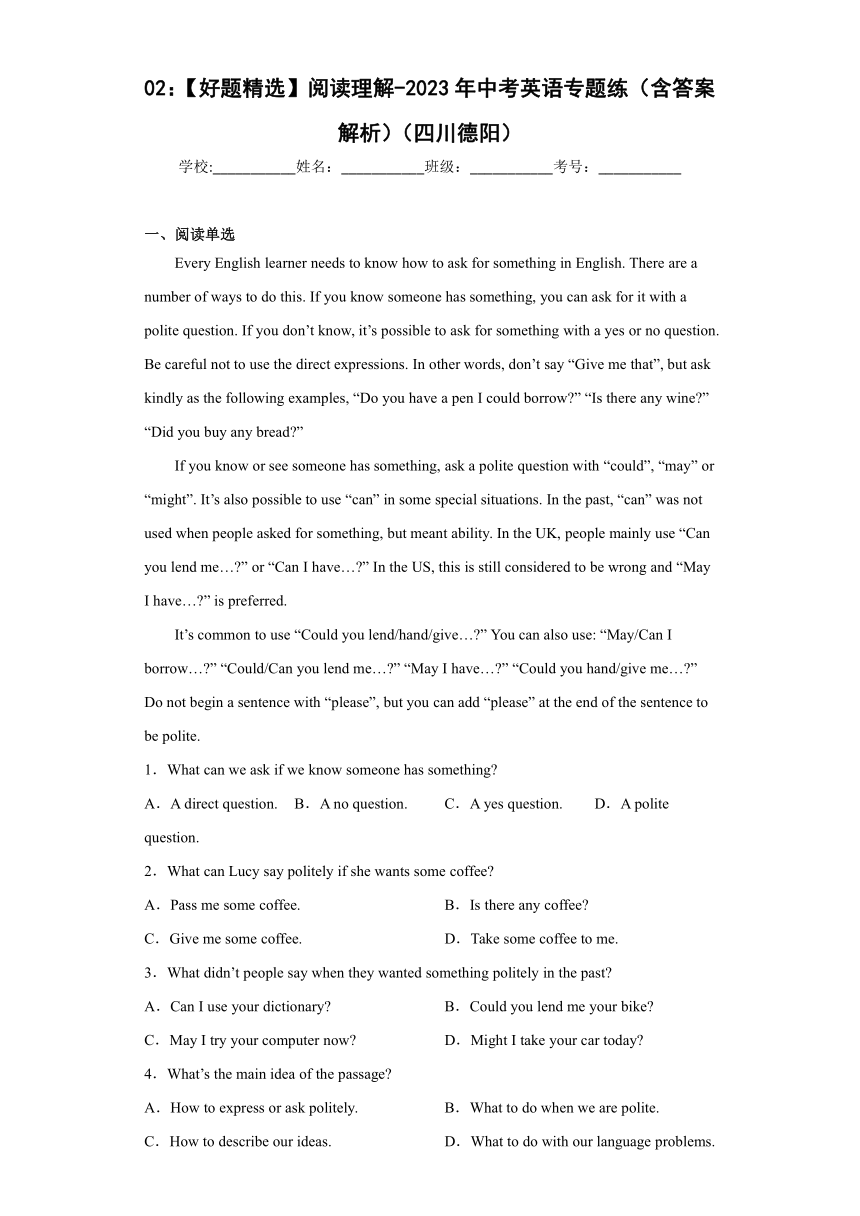 | |
| 格式 | docx | ||
| 文件大小 | 89.5KB | ||
| 资源类型 | 教案 | ||
| 版本资源 | 人教新目标(Go for it)版 | ||
| 科目 | 英语 | ||
| 更新时间 | 2023-04-04 14:37:38 | ||
图片预览

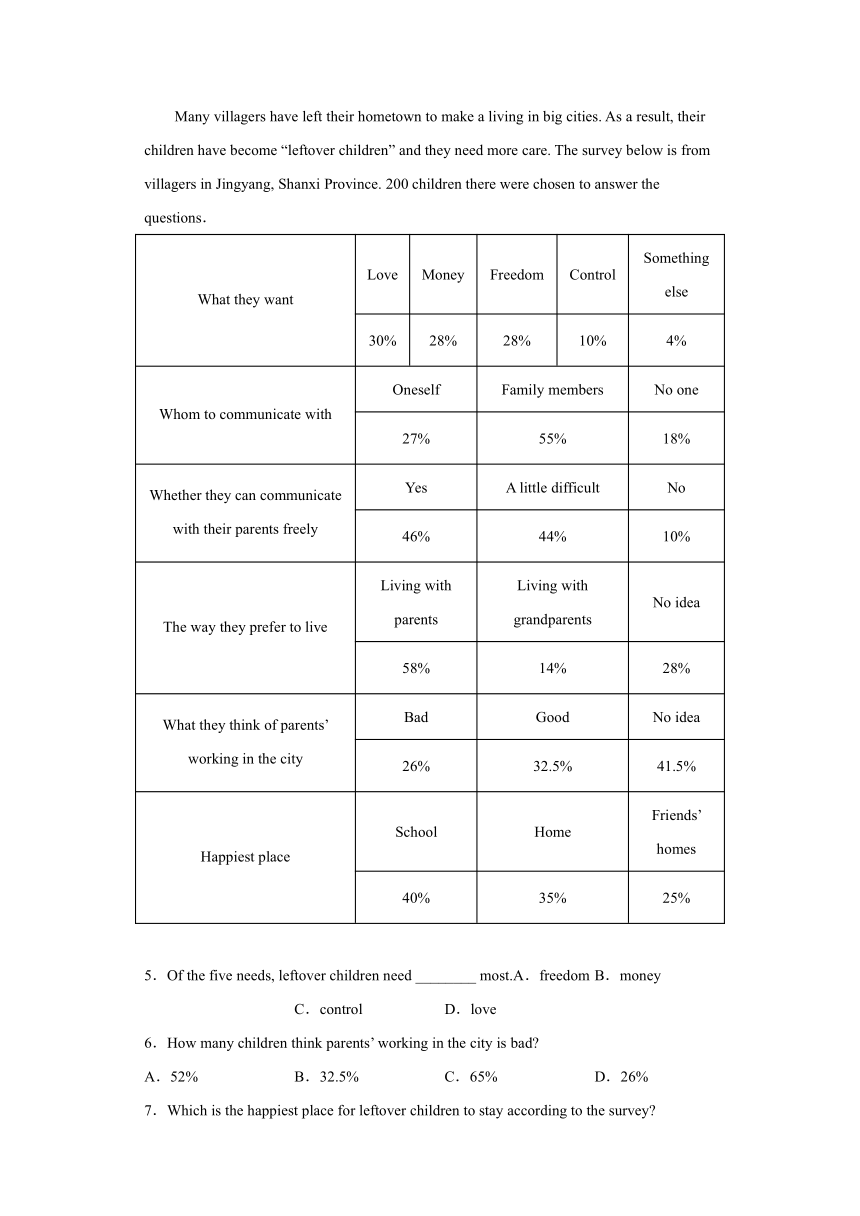
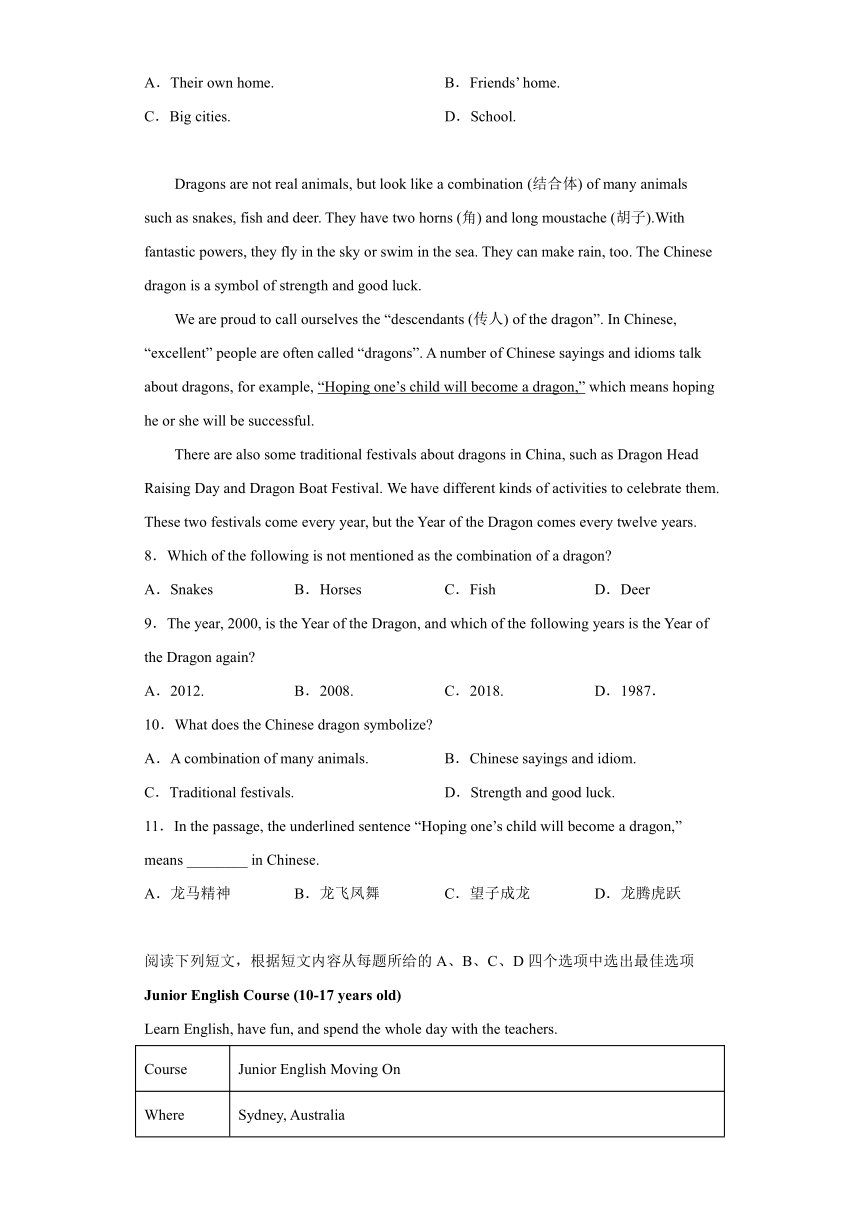
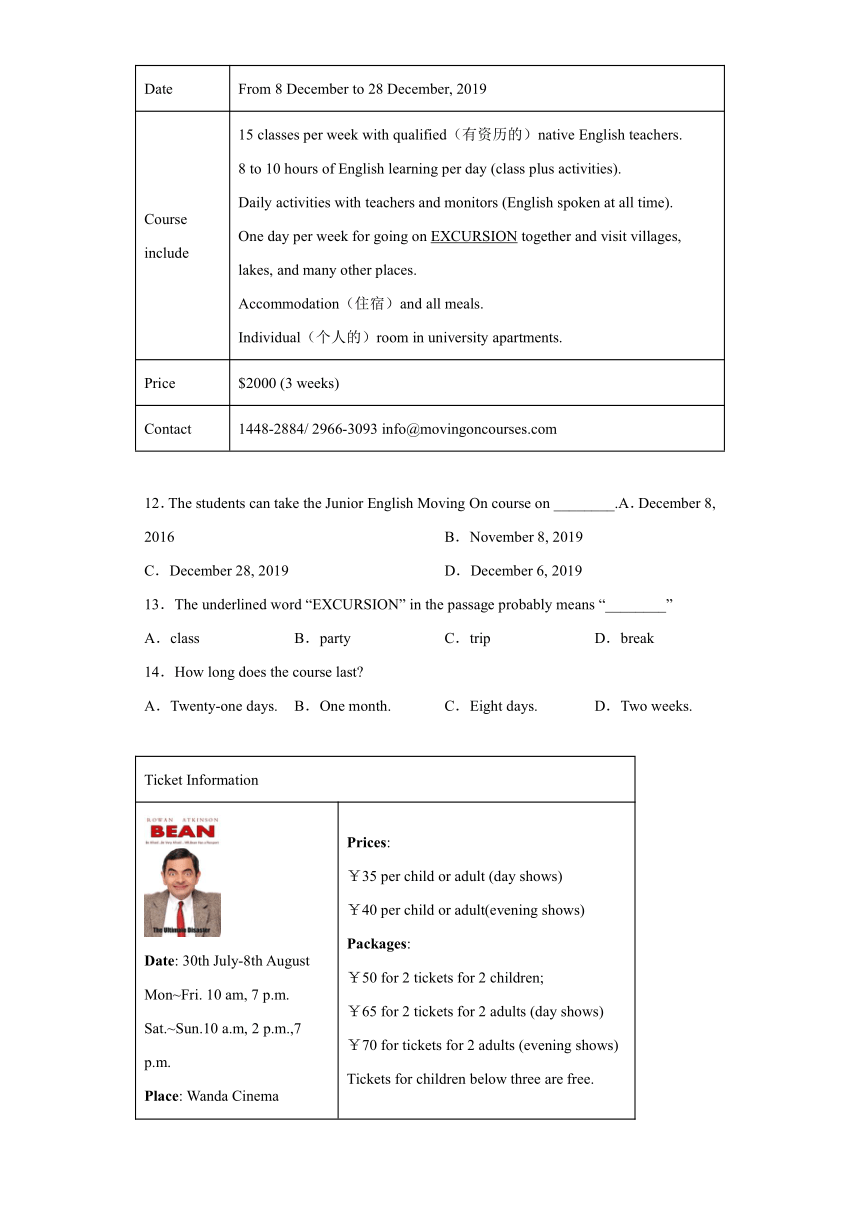
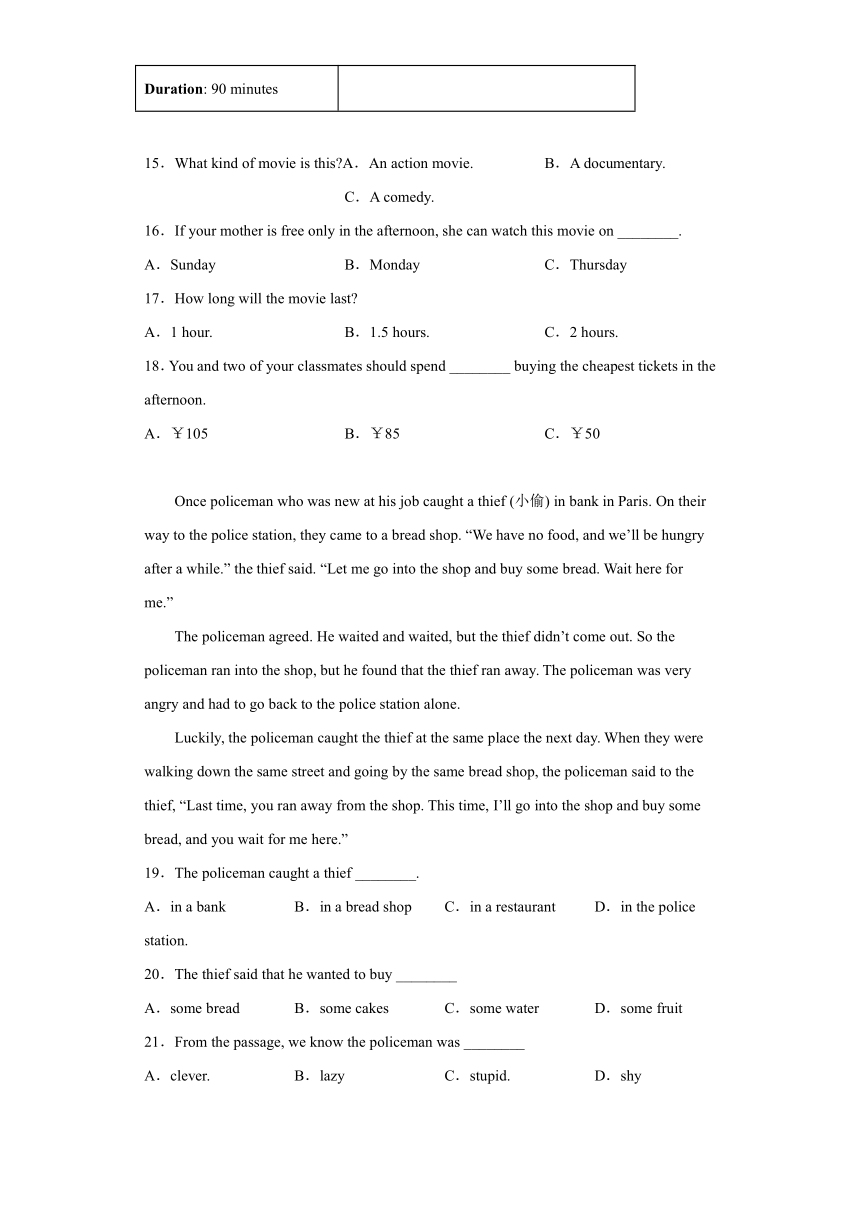
文档简介
02:【好题精选】阅读理解-2023年中考英语专题练(含答案解析)(四川德阳)
学校:___________姓名:___________班级:___________考号:___________
一、阅读单选
Every English learner needs to know how to ask for something in English. There are a number of ways to do this. If you know someone has something, you can ask for it with a polite question. If you don’t know, it’s possible to ask for something with a yes or no question. Be careful not to use the direct expressions. In other words, don’t say “Give me that”, but ask kindly as the following examples, “Do you have a pen I could borrow ” “Is there any wine ” “Did you buy any bread ”
If you know or see someone has something, ask a polite question with “could”, “may” or “might”. It’s also possible to use “can” in some special situations. In the past, “can” was not used when people asked for something, but meant ability. In the UK, people mainly use “Can you lend me… ” or “Can I have… ” In the US, this is still considered to be wrong and “May I have… ” is preferred.
It’s common to use “Could you lend/hand/give… ” You can also use: “May/Can I borrow… ” “Could/Can you lend me… ” “May I have… ” “Could you hand/give me… ” Do not begin a sentence with “please”, but you can add “please” at the end of the sentence to be polite.
1.What can we ask if we know someone has something
A.A direct question. B.A no question. C.A yes question. D.A polite question.
2.What can Lucy say politely if she wants some coffee
A.Pass me some coffee. B.Is there any coffee
C.Give me some coffee. D.Take some coffee to me.
3.What didn’t people say when they wanted something politely in the past
A.Can I use your dictionary B.Could you lend me your bike
C.May I try your computer now D.Might I take your car today
4.What’s the main idea of the passage
A.How to express or ask politely. B.What to do when we are polite.
C.How to describe our ideas. D.What to do with our language problems.
Many villagers have left their hometown to make a living in big cities. As a result, their children have become “leftover children” and they need more care. The survey below is from villagers in Jingyang, Shanxi Province. 200 children there were chosen to answer the questions.
What they want Love Money Freedom Control Something else
30% 28% 28% 10% 4%
Whom to communicate with Oneself Family members No one
27% 55% 18%
Whether they can communicate with their parents freely Yes A little difficult No
46% 44% 10%
The way they prefer to live Living with parents Living with grandparents No idea
58% 14% 28%
What they think of parents’ working in the city Bad Good No idea
26% 32.5% 41.5%
Happiest place School Home Friends’ homes
40% 35% 25%
5.Of the five needs, leftover children need ________ most.A.freedom B.money C.control D.love
6.How many children think parents’ working in the city is bad
A.52% B.32.5% C.65% D.26%
7.Which is the happiest place for leftover children to stay according to the survey
A.Their own home. B.Friends’ home.
C.Big cities. D.School.
Dragons are not real animals, but look like a combination (结合体) of many animals such as snakes, fish and deer. They have two horns (角) and long moustache (胡子).With fantastic powers, they fly in the sky or swim in the sea. They can make rain, too. The Chinese dragon is a symbol of strength and good luck.
We are proud to call ourselves the “descendants (传人) of the dragon”. In Chinese, “excellent” people are often called “dragons”. A number of Chinese sayings and idioms talk about dragons, for example, “Hoping one’s child will become a dragon,” which means hoping he or she will be successful.
There are also some traditional festivals about dragons in China, such as Dragon Head Raising Day and Dragon Boat Festival. We have different kinds of activities to celebrate them. These two festivals come every year, but the Year of the Dragon comes every twelve years.
8.Which of the following is not mentioned as the combination of a dragon
A.Snakes B.Horses C.Fish D.Deer
9.The year, 2000, is the Year of the Dragon, and which of the following years is the Year of the Dragon again
A.2012. B.2008. C.2018. D.1987.
10.What does the Chinese dragon symbolize
A.A combination of many animals. B.Chinese sayings and idiom.
C.Traditional festivals. D.Strength and good luck.
11.In the passage, the underlined sentence “Hoping one’s child will become a dragon,” means ________ in Chinese.
A.龙马精神 B.龙飞凤舞 C.望子成龙 D.龙腾虎跃
阅读下列短文,根据短文内容从每题所给的A、B、C、D四个选项中选出最佳选项
Junior English Course (10-17 years old)
Learn English, have fun, and spend the whole day with the teachers.
Course Junior English Moving On
Where Sydney, Australia
Date From 8 December to 28 December, 2019
Course include 15 classes per week with qualified(有资历的)native English teachers. 8 to 10 hours of English learning per day (class plus activities). Daily activities with teachers and monitors (English spoken at all time). One day per week for going on EXCURSION together and visit villages, lakes, and many other places. Accommodation(住宿)and all meals. Individual(个人的)room in university apartments.
Price $2000 (3 weeks)
Contact 1448-2884/ 2966-3093 info@
12.The students can take the Junior English Moving On course on ________.A.December 8, 2016 B.November 8, 2019
C.December 28, 2019 D.December 6, 2019
13.The underlined word “EXCURSION” in the passage probably means “________”
A.class B.party C.trip D.break
14.How long does the course last
A.Twenty-one days. B.One month. C.Eight days. D.Two weeks.
Ticket Information
Date: 30th July-8th August Mon~Fri. 10 am, 7 p.m. Sat.~Sun.10 a.m, 2 p.m.,7 p.m. Place: Wanda Cinema Duration: 90 minutes Prices: ¥35 per child or adult (day shows) ¥40 per child or adult(evening shows) Packages: ¥50 for 2 tickets for 2 children; ¥65 for 2 tickets for 2 adults (day shows) ¥70 for tickets for 2 adults (evening shows) Tickets for children below three are free.
15.What kind of movie is this A.An action movie. B.A documentary. C.A comedy.
16.If your mother is free only in the afternoon, she can watch this movie on ________.
A.Sunday B.Monday C.Thursday
17.How long will the movie last
A.1 hour. B.1.5 hours. C.2 hours.
18.You and two of your classmates should spend ________ buying the cheapest tickets in the afternoon.
A.¥105 B.¥85 C.¥50
Once policeman who was new at his job caught a thief (小偷) in bank in Paris. On their way to the police station, they came to a bread shop. “We have no food, and we’ll be hungry after a while.” the thief said. “Let me go into the shop and buy some bread. Wait here for me.”
The policeman agreed. He waited and waited, but the thief didn’t come out. So the policeman ran into the shop, but he found that the thief ran away. The policeman was very angry and had to go back to the police station alone.
Luckily, the policeman caught the thief at the same place the next day. When they were walking down the same street and going by the same bread shop, the policeman said to the thief, “Last time, you ran away from the shop. This time, I’ll go into the shop and buy some bread, and you wait for me here.”
19.The policeman caught a thief ________.
A.in a bank B.in a bread shop C.in a restaurant D.in the police station.
20.The thief said that he wanted to buy ________
A.some bread B.some cakes C.some water D.some fruit
21.From the passage, we know the policeman was ________
A.clever. B.lazy C.stupid. D.shy
Coffee has been a part of people’s lives for thousands of years, and today it is still a favorite drink of millions of people in the world. Coffee is so popular, but do you know the story of coffee and how it was discovered
There is an old story that says coffee was discovered in Africa, long time ago. One day, a farmer was watching his goats, and he saw them eat some small berries (干种子) from a plant. After they ate the berries, the goats became very active. The man often felt tired, so he decided to try the berries, too. Surprisingly, he did not feel tired any more. Coffee plants were thus discovered. Then coffee was taken from Africa to Arabia(阿拉伯半岛), and there it was first used as medicine. The Arabs kept coffee a secret for many years. Later, coffee came to Turkey(土耳其), then Italy, then France. From Europe, coffee plants taken to America. People found that coffee plants grew well in many parts of South America, so large coffee farms were started, and many coffee plants were grown. On these farms, coffee beans were picked from the plants by hand. Then the beans were dried and prepared for market to sell. Different coffee beans were mixed together to produce different kinds of coffee. Coffee was sent to all over the world, and soon became very popular.
22.Coffee came from _______.
A.Europe B.Africa C.America D.Arabia
23.Coffee was first used as _________ in Arabia.
A.food B.drink C.medicine D.mixture
24.People on the farm got coffee beans from the plants_________.
A.with knives B.with machines C.by hand D.by scissors
25.What was the probable reason that large coffee farms were started in South America
A.Many parts there were suitable for planting coffee
B.People there were good at Plating coffee
C.It often rained in South America
D. Americans liked to drink coffee
26.Which of the following is True
A.A farmer in South America discovered coffee
B.Coffee has been a part of people’s lives for hundred years
C.One day some horses ate some small berries from a plant and the become active
D.Many people all over the world now like drinking coffee
Do you know Liu Xiuxiang This name might be strange to you, but you must have heard about the story of him. He “carried” his sick mom to his university while studied in Shandong. His mom wasn’t able to look after herself after his dad passed away. He had to support the whole family. Life was difficult, but he went on studying hard. Finally he got into the university.
Many years later, Liu was noticed by public again. He won the honor—the “May 4th” Medal of Chinese Youth. After he graduated from university in 2012, Liu refused many highly paid job and went back to his hometown, Guizhou Province. There he has been working as a teacher for 9 years. He said, “I hope to do something for more children whose lives are similar to mine.”
In fact, Liu supported three poor children when he was in high school. Till now, he has helped more than 1,700 students and given more than 100 speeches. His story has warmed many people. As the song sings “What doesn’t kill you makes you stronger.” There is no doubt that he will give more hope to more children in the future.
27.Why did Liu Xuxiang “carry” his mom to the university
A.Because his mom couldn’t take care of herself.
B.Because his mom wanted to work in the university.
C.Because his mom was too lonely.
D.Because Liu was not independent.
28.Liu Xiuxiang worked as a ________ after he graduated from the university.
A.a policeman B.a doctor
C.a teacher D.an officer
29.When did Liu start to support poor children
A.When he graduated from university in 2012.
B.After he won the May 4th Medal of Chinese Youth.
C.When he got into the university.
D.When he was a high school student.
30.What do you think of Liu Xiuxiang
A.Kind and helpful. B.Honest and brave.
C.Polite and responsible. D.Hard-working and shy.
参考答案:
1.D 2.B 3.A 4.A
【导语】本文主要讲述在英语中应该怎样礼貌地表达或询问。
1.细节理解题。根据第一段“If you know someone has something, you can ask for it with a polite question”可知,如果你知道某人有某样东西,你可以礼貌地询问要求这样东西。故选D。
2.推理判断题。根据“but ask kindly as the following examples, ‘Do you have a pen I could borrow ’ ‘Is there any wine ’ ‘Did you buy any bread ’ ”可知如果想要咖啡可以礼貌地说“Is there any coffee ”。故选B。
3.推理判断题。根据“In the past, ‘can’ was not used when people asked for something, but meant ability”在过去,当人们要某物时can不被使用,因为can表示能力。可知在过去人们不会用“Can I use your dictionary”。故选A。
4.主旨大意题。根据第一段“Every English learner needs to know how to ask for something in English. There are a number of ways to do this”可知文章主要讲述在英语中应该怎样礼貌地表达或询问。可概括为How to express or ask politely。故选A。
5.D 6.D 7.D
【导语】本文是对于留守儿童的一则调查报告。
5.细节理解题。根据“What they want”这一栏内容可知,最需要的是爱,故选D。
6.细节理解题。根据“What they think of parents’ working in the city”这一栏内容可知,26%的孩子认为父母在城里工作是不好的,故选D。
7.细节理解题。根据“Happiest place”这一栏内容可知,最开心的地方是学校,故选D。
8.B 9.A 10.D 11.C
【导语】本文主要介绍了龙在中国文化上的意义以及与龙有关的节日。
8.细节理解题。根据“Dragons are not real animals, but look like a combination (结合体) of many animals such as snakes, fish and deer”可知,是蛇,鱼和鹿的结合体,没有提到马,故选B。
9.推理判断题。根据“but the Year of the Dragon comes every twelve years”可知,龙年每十二年一次,所以2000年是龙年,2012年也是龙年,故选A。
10.细节理解题。根据“The Chinese dragon is a symbol of strength and good luck”可知,中国龙是力量和好运的象征,故选D。
11.句意猜测题。根据“which means hoping he or she will be successful”可知,这句话是希望孩子成功,也就是“望子成龙”,故选C。
12.C 13.C 14.A
【导语】本文是一篇应用文,介绍了初级英语课程的时间、地点、内容等。
12.细节理解题。根据“From 8 December to 28 December, 2019”可知,该课程的时间是2019年12月8日至12月28日,故可以在2019年12月28日参加该课程。故选C。
13.词句猜测题。根据“and visit villages, lakes, and many other places.”可知,参观村庄、湖泊等属于旅行;故划线部分单词意为“旅行”。故选C。
14.细节理解题。根据“From 8 December to 28 December, 2019”可知,该课程的时间是2019年12月8日至12月28日,共21天。故选A。
15.C 16.A 17.B 18.B
【导语】本文是一篇广告,主要介绍了一部电影的相关放映信息。
15.细节理解题。根据图片可知,图片显示的是憨豆先生,是喜剧片,故选C。
16.细节理解题。根据“Sat.~Sun.10 a.m, 2 p.m.,7 p.m.”可知,周末下午2点有放映,故选A。
17.细节理解题。根据“Duration: 90 minutes”可知,电影持续一个半小时,故选B。
18.细节理解题。根据“Prices:¥35 per child or adult (day shows)”及“Packages:¥50 for 2 tickets for 2 children;”可知,一个孩子白天场是35美元,两个孩子白天场打包价是50美元,所以三个孩子最便宜需要85美元,故选B。
19.A 20.A 21.C
【导语】本文主要讲述了警察两次抓住同一个小偷的故事。
19.细节理解题。根据“Once a policeman who was new at his job caught a thief(小偷)in a bank in Paris”可知,在银行抓住了小偷,故选A。
20.细节理解题。根据“Let me go into the shop and buy some bread”可知,小偷说想买一些面包,故选A。
21.推理判断题。警察第一抓住小偷时,小偷用买面包的借口偷跑了,第二次再次抓住这个小偷时,警察说这一次他进去买面包,最后小偷还是再次逃跑,由此可见警察是很愚蠢的,故选C。
22.B 23.C 24.C 25.A 26.D
【导语】本文介绍了咖啡的历史。
22.细节理解题。根据“There is an old story that says coffee was discovered in Africa, long time ago.”可知,咖啡来自非洲,故选B。
23.细节理解题。根据“Then coffee was taken from Africa to Arabia(阿拉伯半岛), and there it was first used as medicine.”可知,咖啡首先被用作药物,故选C。
24.细节理解题。根据“On these farms, coffee beans were picked from the plants by hand.”可知,在这些农场里,咖啡豆是手工采摘的。故选C。
25.细节理解题。根据“People found that coffee plants grew well in many parts of South America, so large coffee farms were started, and many coffee plants were grown.”可知,人们发现咖啡植物在南美洲的许多地方生长良好,因此建立了大型咖啡农场,种植了许多咖啡植物,故选A。
26.推理判断题。根据“Coffee has been a part of people’s lives for thousands of years, and today it is still a favorite drink of millions of people in the world.”可知,现在世界上许多人都喜欢喝咖啡,故选D。
27.A 28.C 29.D 30.A
【导语】本文主要介绍了刘秀祥千里背母上大学,并在毕业后拒绝高薪工作回家乡做一名教师的事情,他帮助了很多学生,他的故事温暖了许多人。
27.细节理解题。根据“He ‘carried’ his sick mom to his university while studied in Shandong. His mom wasn’t able to look after herself after his dad passed away.”可知刘秀祥背着妈妈去上大学是因为他妈妈照顾不了自己。故选A。
28.细节理解题。根据“After he graduated from university in 2012, Liu refused many highly paid job and went back to his hometown, Guizhou Province. There he has been working as a teacher for 9 years”可知大学毕业后刘秀祥做了一名老师。故选C。
29.细节理解题。根据“In fact, Liu supported three poor children when he was in high school”可知当刘秀祥还是个高中生的时候,就开始资助贫穷孩子们。故选D。
30.观点态度题。根据“I hope to do something for more children whose lives are similar to mine”及“Till now, he has helped more than 1,700 students and given more than 100 speeches”可知刘秀祥希望能为和他有相似生活的孩子们做些事,他是善良的,他帮助了1700多个学生,这说明他是乐于助人的。故选A。
学校:___________姓名:___________班级:___________考号:___________
一、阅读单选
Every English learner needs to know how to ask for something in English. There are a number of ways to do this. If you know someone has something, you can ask for it with a polite question. If you don’t know, it’s possible to ask for something with a yes or no question. Be careful not to use the direct expressions. In other words, don’t say “Give me that”, but ask kindly as the following examples, “Do you have a pen I could borrow ” “Is there any wine ” “Did you buy any bread ”
If you know or see someone has something, ask a polite question with “could”, “may” or “might”. It’s also possible to use “can” in some special situations. In the past, “can” was not used when people asked for something, but meant ability. In the UK, people mainly use “Can you lend me… ” or “Can I have… ” In the US, this is still considered to be wrong and “May I have… ” is preferred.
It’s common to use “Could you lend/hand/give… ” You can also use: “May/Can I borrow… ” “Could/Can you lend me… ” “May I have… ” “Could you hand/give me… ” Do not begin a sentence with “please”, but you can add “please” at the end of the sentence to be polite.
1.What can we ask if we know someone has something
A.A direct question. B.A no question. C.A yes question. D.A polite question.
2.What can Lucy say politely if she wants some coffee
A.Pass me some coffee. B.Is there any coffee
C.Give me some coffee. D.Take some coffee to me.
3.What didn’t people say when they wanted something politely in the past
A.Can I use your dictionary B.Could you lend me your bike
C.May I try your computer now D.Might I take your car today
4.What’s the main idea of the passage
A.How to express or ask politely. B.What to do when we are polite.
C.How to describe our ideas. D.What to do with our language problems.
Many villagers have left their hometown to make a living in big cities. As a result, their children have become “leftover children” and they need more care. The survey below is from villagers in Jingyang, Shanxi Province. 200 children there were chosen to answer the questions.
What they want Love Money Freedom Control Something else
30% 28% 28% 10% 4%
Whom to communicate with Oneself Family members No one
27% 55% 18%
Whether they can communicate with their parents freely Yes A little difficult No
46% 44% 10%
The way they prefer to live Living with parents Living with grandparents No idea
58% 14% 28%
What they think of parents’ working in the city Bad Good No idea
26% 32.5% 41.5%
Happiest place School Home Friends’ homes
40% 35% 25%
5.Of the five needs, leftover children need ________ most.A.freedom B.money C.control D.love
6.How many children think parents’ working in the city is bad
A.52% B.32.5% C.65% D.26%
7.Which is the happiest place for leftover children to stay according to the survey
A.Their own home. B.Friends’ home.
C.Big cities. D.School.
Dragons are not real animals, but look like a combination (结合体) of many animals such as snakes, fish and deer. They have two horns (角) and long moustache (胡子).With fantastic powers, they fly in the sky or swim in the sea. They can make rain, too. The Chinese dragon is a symbol of strength and good luck.
We are proud to call ourselves the “descendants (传人) of the dragon”. In Chinese, “excellent” people are often called “dragons”. A number of Chinese sayings and idioms talk about dragons, for example, “Hoping one’s child will become a dragon,” which means hoping he or she will be successful.
There are also some traditional festivals about dragons in China, such as Dragon Head Raising Day and Dragon Boat Festival. We have different kinds of activities to celebrate them. These two festivals come every year, but the Year of the Dragon comes every twelve years.
8.Which of the following is not mentioned as the combination of a dragon
A.Snakes B.Horses C.Fish D.Deer
9.The year, 2000, is the Year of the Dragon, and which of the following years is the Year of the Dragon again
A.2012. B.2008. C.2018. D.1987.
10.What does the Chinese dragon symbolize
A.A combination of many animals. B.Chinese sayings and idiom.
C.Traditional festivals. D.Strength and good luck.
11.In the passage, the underlined sentence “Hoping one’s child will become a dragon,” means ________ in Chinese.
A.龙马精神 B.龙飞凤舞 C.望子成龙 D.龙腾虎跃
阅读下列短文,根据短文内容从每题所给的A、B、C、D四个选项中选出最佳选项
Junior English Course (10-17 years old)
Learn English, have fun, and spend the whole day with the teachers.
Course Junior English Moving On
Where Sydney, Australia
Date From 8 December to 28 December, 2019
Course include 15 classes per week with qualified(有资历的)native English teachers. 8 to 10 hours of English learning per day (class plus activities). Daily activities with teachers and monitors (English spoken at all time). One day per week for going on EXCURSION together and visit villages, lakes, and many other places. Accommodation(住宿)and all meals. Individual(个人的)room in university apartments.
Price $2000 (3 weeks)
Contact 1448-2884/ 2966-3093 info@
12.The students can take the Junior English Moving On course on ________.A.December 8, 2016 B.November 8, 2019
C.December 28, 2019 D.December 6, 2019
13.The underlined word “EXCURSION” in the passage probably means “________”
A.class B.party C.trip D.break
14.How long does the course last
A.Twenty-one days. B.One month. C.Eight days. D.Two weeks.
Ticket Information
Date: 30th July-8th August Mon~Fri. 10 am, 7 p.m. Sat.~Sun.10 a.m, 2 p.m.,7 p.m. Place: Wanda Cinema Duration: 90 minutes Prices: ¥35 per child or adult (day shows) ¥40 per child or adult(evening shows) Packages: ¥50 for 2 tickets for 2 children; ¥65 for 2 tickets for 2 adults (day shows) ¥70 for tickets for 2 adults (evening shows) Tickets for children below three are free.
15.What kind of movie is this A.An action movie. B.A documentary. C.A comedy.
16.If your mother is free only in the afternoon, she can watch this movie on ________.
A.Sunday B.Monday C.Thursday
17.How long will the movie last
A.1 hour. B.1.5 hours. C.2 hours.
18.You and two of your classmates should spend ________ buying the cheapest tickets in the afternoon.
A.¥105 B.¥85 C.¥50
Once policeman who was new at his job caught a thief (小偷) in bank in Paris. On their way to the police station, they came to a bread shop. “We have no food, and we’ll be hungry after a while.” the thief said. “Let me go into the shop and buy some bread. Wait here for me.”
The policeman agreed. He waited and waited, but the thief didn’t come out. So the policeman ran into the shop, but he found that the thief ran away. The policeman was very angry and had to go back to the police station alone.
Luckily, the policeman caught the thief at the same place the next day. When they were walking down the same street and going by the same bread shop, the policeman said to the thief, “Last time, you ran away from the shop. This time, I’ll go into the shop and buy some bread, and you wait for me here.”
19.The policeman caught a thief ________.
A.in a bank B.in a bread shop C.in a restaurant D.in the police station.
20.The thief said that he wanted to buy ________
A.some bread B.some cakes C.some water D.some fruit
21.From the passage, we know the policeman was ________
A.clever. B.lazy C.stupid. D.shy
Coffee has been a part of people’s lives for thousands of years, and today it is still a favorite drink of millions of people in the world. Coffee is so popular, but do you know the story of coffee and how it was discovered
There is an old story that says coffee was discovered in Africa, long time ago. One day, a farmer was watching his goats, and he saw them eat some small berries (干种子) from a plant. After they ate the berries, the goats became very active. The man often felt tired, so he decided to try the berries, too. Surprisingly, he did not feel tired any more. Coffee plants were thus discovered. Then coffee was taken from Africa to Arabia(阿拉伯半岛), and there it was first used as medicine. The Arabs kept coffee a secret for many years. Later, coffee came to Turkey(土耳其), then Italy, then France. From Europe, coffee plants taken to America. People found that coffee plants grew well in many parts of South America, so large coffee farms were started, and many coffee plants were grown. On these farms, coffee beans were picked from the plants by hand. Then the beans were dried and prepared for market to sell. Different coffee beans were mixed together to produce different kinds of coffee. Coffee was sent to all over the world, and soon became very popular.
22.Coffee came from _______.
A.Europe B.Africa C.America D.Arabia
23.Coffee was first used as _________ in Arabia.
A.food B.drink C.medicine D.mixture
24.People on the farm got coffee beans from the plants_________.
A.with knives B.with machines C.by hand D.by scissors
25.What was the probable reason that large coffee farms were started in South America
A.Many parts there were suitable for planting coffee
B.People there were good at Plating coffee
C.It often rained in South America
D. Americans liked to drink coffee
26.Which of the following is True
A.A farmer in South America discovered coffee
B.Coffee has been a part of people’s lives for hundred years
C.One day some horses ate some small berries from a plant and the become active
D.Many people all over the world now like drinking coffee
Do you know Liu Xiuxiang This name might be strange to you, but you must have heard about the story of him. He “carried” his sick mom to his university while studied in Shandong. His mom wasn’t able to look after herself after his dad passed away. He had to support the whole family. Life was difficult, but he went on studying hard. Finally he got into the university.
Many years later, Liu was noticed by public again. He won the honor—the “May 4th” Medal of Chinese Youth. After he graduated from university in 2012, Liu refused many highly paid job and went back to his hometown, Guizhou Province. There he has been working as a teacher for 9 years. He said, “I hope to do something for more children whose lives are similar to mine.”
In fact, Liu supported three poor children when he was in high school. Till now, he has helped more than 1,700 students and given more than 100 speeches. His story has warmed many people. As the song sings “What doesn’t kill you makes you stronger.” There is no doubt that he will give more hope to more children in the future.
27.Why did Liu Xuxiang “carry” his mom to the university
A.Because his mom couldn’t take care of herself.
B.Because his mom wanted to work in the university.
C.Because his mom was too lonely.
D.Because Liu was not independent.
28.Liu Xiuxiang worked as a ________ after he graduated from the university.
A.a policeman B.a doctor
C.a teacher D.an officer
29.When did Liu start to support poor children
A.When he graduated from university in 2012.
B.After he won the May 4th Medal of Chinese Youth.
C.When he got into the university.
D.When he was a high school student.
30.What do you think of Liu Xiuxiang
A.Kind and helpful. B.Honest and brave.
C.Polite and responsible. D.Hard-working and shy.
参考答案:
1.D 2.B 3.A 4.A
【导语】本文主要讲述在英语中应该怎样礼貌地表达或询问。
1.细节理解题。根据第一段“If you know someone has something, you can ask for it with a polite question”可知,如果你知道某人有某样东西,你可以礼貌地询问要求这样东西。故选D。
2.推理判断题。根据“but ask kindly as the following examples, ‘Do you have a pen I could borrow ’ ‘Is there any wine ’ ‘Did you buy any bread ’ ”可知如果想要咖啡可以礼貌地说“Is there any coffee ”。故选B。
3.推理判断题。根据“In the past, ‘can’ was not used when people asked for something, but meant ability”在过去,当人们要某物时can不被使用,因为can表示能力。可知在过去人们不会用“Can I use your dictionary”。故选A。
4.主旨大意题。根据第一段“Every English learner needs to know how to ask for something in English. There are a number of ways to do this”可知文章主要讲述在英语中应该怎样礼貌地表达或询问。可概括为How to express or ask politely。故选A。
5.D 6.D 7.D
【导语】本文是对于留守儿童的一则调查报告。
5.细节理解题。根据“What they want”这一栏内容可知,最需要的是爱,故选D。
6.细节理解题。根据“What they think of parents’ working in the city”这一栏内容可知,26%的孩子认为父母在城里工作是不好的,故选D。
7.细节理解题。根据“Happiest place”这一栏内容可知,最开心的地方是学校,故选D。
8.B 9.A 10.D 11.C
【导语】本文主要介绍了龙在中国文化上的意义以及与龙有关的节日。
8.细节理解题。根据“Dragons are not real animals, but look like a combination (结合体) of many animals such as snakes, fish and deer”可知,是蛇,鱼和鹿的结合体,没有提到马,故选B。
9.推理判断题。根据“but the Year of the Dragon comes every twelve years”可知,龙年每十二年一次,所以2000年是龙年,2012年也是龙年,故选A。
10.细节理解题。根据“The Chinese dragon is a symbol of strength and good luck”可知,中国龙是力量和好运的象征,故选D。
11.句意猜测题。根据“which means hoping he or she will be successful”可知,这句话是希望孩子成功,也就是“望子成龙”,故选C。
12.C 13.C 14.A
【导语】本文是一篇应用文,介绍了初级英语课程的时间、地点、内容等。
12.细节理解题。根据“From 8 December to 28 December, 2019”可知,该课程的时间是2019年12月8日至12月28日,故可以在2019年12月28日参加该课程。故选C。
13.词句猜测题。根据“and visit villages, lakes, and many other places.”可知,参观村庄、湖泊等属于旅行;故划线部分单词意为“旅行”。故选C。
14.细节理解题。根据“From 8 December to 28 December, 2019”可知,该课程的时间是2019年12月8日至12月28日,共21天。故选A。
15.C 16.A 17.B 18.B
【导语】本文是一篇广告,主要介绍了一部电影的相关放映信息。
15.细节理解题。根据图片可知,图片显示的是憨豆先生,是喜剧片,故选C。
16.细节理解题。根据“Sat.~Sun.10 a.m, 2 p.m.,7 p.m.”可知,周末下午2点有放映,故选A。
17.细节理解题。根据“Duration: 90 minutes”可知,电影持续一个半小时,故选B。
18.细节理解题。根据“Prices:¥35 per child or adult (day shows)”及“Packages:¥50 for 2 tickets for 2 children;”可知,一个孩子白天场是35美元,两个孩子白天场打包价是50美元,所以三个孩子最便宜需要85美元,故选B。
19.A 20.A 21.C
【导语】本文主要讲述了警察两次抓住同一个小偷的故事。
19.细节理解题。根据“Once a policeman who was new at his job caught a thief(小偷)in a bank in Paris”可知,在银行抓住了小偷,故选A。
20.细节理解题。根据“Let me go into the shop and buy some bread”可知,小偷说想买一些面包,故选A。
21.推理判断题。警察第一抓住小偷时,小偷用买面包的借口偷跑了,第二次再次抓住这个小偷时,警察说这一次他进去买面包,最后小偷还是再次逃跑,由此可见警察是很愚蠢的,故选C。
22.B 23.C 24.C 25.A 26.D
【导语】本文介绍了咖啡的历史。
22.细节理解题。根据“There is an old story that says coffee was discovered in Africa, long time ago.”可知,咖啡来自非洲,故选B。
23.细节理解题。根据“Then coffee was taken from Africa to Arabia(阿拉伯半岛), and there it was first used as medicine.”可知,咖啡首先被用作药物,故选C。
24.细节理解题。根据“On these farms, coffee beans were picked from the plants by hand.”可知,在这些农场里,咖啡豆是手工采摘的。故选C。
25.细节理解题。根据“People found that coffee plants grew well in many parts of South America, so large coffee farms were started, and many coffee plants were grown.”可知,人们发现咖啡植物在南美洲的许多地方生长良好,因此建立了大型咖啡农场,种植了许多咖啡植物,故选A。
26.推理判断题。根据“Coffee has been a part of people’s lives for thousands of years, and today it is still a favorite drink of millions of people in the world.”可知,现在世界上许多人都喜欢喝咖啡,故选D。
27.A 28.C 29.D 30.A
【导语】本文主要介绍了刘秀祥千里背母上大学,并在毕业后拒绝高薪工作回家乡做一名教师的事情,他帮助了很多学生,他的故事温暖了许多人。
27.细节理解题。根据“He ‘carried’ his sick mom to his university while studied in Shandong. His mom wasn’t able to look after herself after his dad passed away.”可知刘秀祥背着妈妈去上大学是因为他妈妈照顾不了自己。故选A。
28.细节理解题。根据“After he graduated from university in 2012, Liu refused many highly paid job and went back to his hometown, Guizhou Province. There he has been working as a teacher for 9 years”可知大学毕业后刘秀祥做了一名老师。故选C。
29.细节理解题。根据“In fact, Liu supported three poor children when he was in high school”可知当刘秀祥还是个高中生的时候,就开始资助贫穷孩子们。故选D。
30.观点态度题。根据“I hope to do something for more children whose lives are similar to mine”及“Till now, he has helped more than 1,700 students and given more than 100 speeches”可知刘秀祥希望能为和他有相似生活的孩子们做些事,他是善良的,他帮助了1700多个学生,这说明他是乐于助人的。故选A。
同课章节目录
- 词法
- 名词
- 动词和动词短语
- 动词语态
- 动词时态
- 助动词和情态动词
- 非谓语动词
- 冠词
- 代词
- 数词和量词
- 形容词副词及其比较等级
- 介词和介词短语
- 连词和感叹词
- 构词法
- 相似、相近词比较
- 句法
- 陈述句
- 一般疑问句和否定疑问句
- 特殊疑问句及选择疑问句
- 反意疑问句
- 存在句(There be句型)
- 宾语从句
- 定语从句
- 状语从句
- 主谓一致问题
- 简单句
- 并列句
- 复合句
- 主谓一致
- 主、表语从句
- 名词性从句
- 直接引语和间接引语
- 虚拟语气
- 感叹句
- 强调句
- 倒装句
- 祈使句
- 句子的成分
- 句子的分类
- 题型专区
- 单项选择部分
- 易错题
- 完形填空
- 阅读理解
- 词汇练习
- 听说训练
- 句型转换
- 补全对话
- 短文改错
- 翻译
- 书面表达
- 任务型阅读
- 语法填空
- 其他资料
